
The army chief, the chief justice and the Opposition leader is bent upon dislodging the Zardari government which is apparently not going to back down without a fight this time, reports Amir Mir from Islamabad.
The Pakistan supreme court's January 16 decision to issue an unprecedented show cause notice to Prime Minister Yusuf Raza Gilani has further deepened the political crisis which is clearly threatening the democratic dispensation in Pakistan.
Government circles in Islamabad say the hostile court verdict has made it known to all and sundry that the unholy judiciary-military nexus was out to drive out the Asif Ali Zardari government.
The apex court made it clear that the prime minister would have to personally appear before it on Thursday, January 19, and if dissatisfied with his explanation, the court could indict him for committing contempt of court and initiate a trial against him.
A seven-judge supreme court bench issued the order after the government failed to come up with a response to the six options laid down at the last hearing on Monday, January 16, pertaining to the implementation of the court decision about the National Reconciliation Ordinance.
The NRO is a controversial presidential ordinance issued by General Pervez Musharraf in October 2007 to grant general amnesty to politicians and bureaucrats who were accused of corruption, embezzlement, money laundering, murder and terrorism between January 1, 1986 and October 12, 1999, the time-frame between two occasions of martial law in Pakistan.
The NRO was basically meant to promote national reconciliation and removing the vestiges of political vendetta and victimisation in the country.
However, the NRO was declared unconstitutional by the supreme court which directed the Pakistan Peoples Party government to reopen all the corruption cases withdrawn under the NRO.
Please click on NEXT for more...
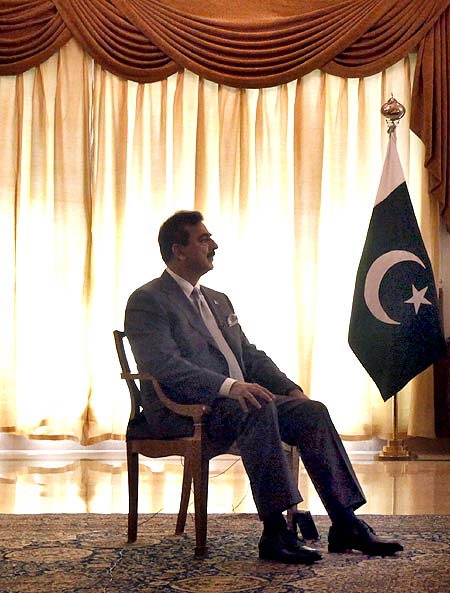
Although the government has reopened 155 cases, the court insists that it should also write a letter to the Swiss authorities to re-open the cases of alleged corruption against President Zardari.
The government insisted that the holder of the post of the president is provided immunity by the constitution to which Chief Justice Iftikhar Chaudhry responded that if the president believes he has immunity under the constitution, he needs to state this before the apex court.
But President Zardari is not ready to approach the court on the issue, fearing that the chief justice might withdraw his immunity. On the other hand, Prime Minister Gilani is not ready to write a letter to the Swiss authorities.
Therefore, the court deemed it fit to charge the prime minister with contempt of court.
'In the circumstances we have left with no option but to issue show cause notice under section 17 of the ordinance 5 of 2003 read with article 204 of the constitution to the prime minister as to why he should not be proceeded against for contempt of the court,' the court said in its order.
Under section 17(2) of the ordinance 5, the prime minister would have to personally appear before the court on January 19, it said. If dissatisfied with the explanation, the court could indict the prime minister for committing contempt and initiate a trial against him.
However, the prime minister can continue in office till the case ends. What actually happen remains to be seen and depends on how the prime minister responds to the notice.
There are reports that the prime minister would appear before the apex court, but won't give any commitment to write a letter to the Swiss authorities.
Please click on NEXT for more...
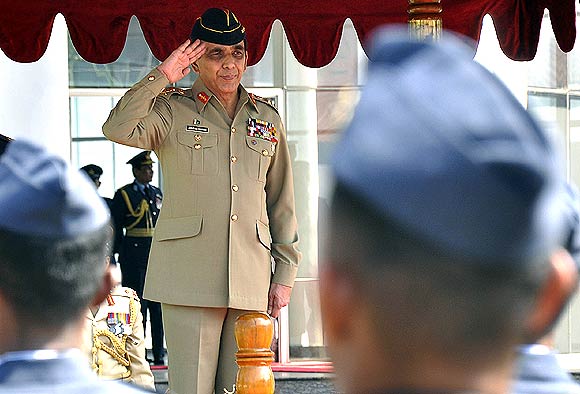
The court orders have been issued at a critical time when Prime Minister Gilani and the military leadership have levelled allegations and counter allegations against each other.
The controversy erupted when the prime minister told a Chinese newspaper (People's Daily Online) that the army chief and Inter Services Intelligence chief had not been given approval by the competent authorities before submitting their responses with the Supreme Court in the Memogate case and they seem to have acted unconstitutionally.
The responses of the army and the ISI chief, which were submitted with the apex court through the secretary, defence, Lieutenant General Naeem Khaled Lodhi (retd), stated that the federal government had no operational control over the armed forces and the ISI.
A day before being indicted, Gilani gave a full-throated defence of democracy and the constitution on January 15 when he told journalists he was not answerable to any individual (while referring to the army chief), but to the people of Pakistan.
He must have made this statement after the media reported that in their one-on-one meeting on January 14, army chief General Ashfaq Pervez Kayani told Zardari that the latter should ask the prime minister to retract his statement where he had said that the army chief and the head of the ISI had acted unconstitutionally when they filed replies to the supreme court in the Memogate case.
Apart from indicating where he stood as far as answering to various entities and groups was concerned, the prime minister also suggested that the military had a constitutional role to play as well, and no one would disagree with the fact that over the years it has quite often ventured outside of that as set down by the country's constitution.
The day the prime minister was served with a show cause notice by the apex court, the national assembly (the lower house of Pakistan's parliament) gave his coalition government a major morale boost in the face of perceived challenges with a resolution passed with a reasonable majority of 250 votes, reposing confidence in the political leadership and urging all State institutions to remain within their constitutional limits.
Please click on NEXT for more...
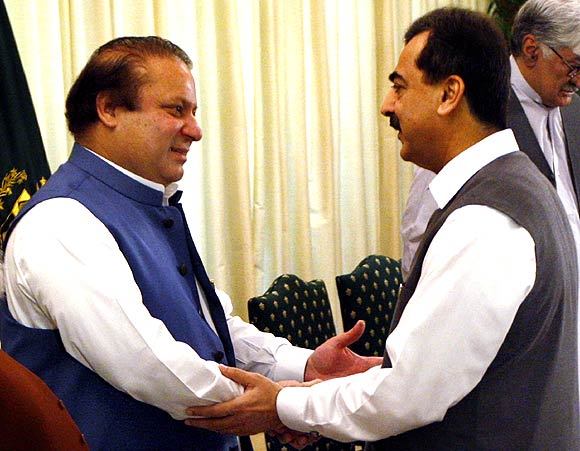
The contempt notice has been issued to the prime minister at a time when the military and intelligence establishment and the civilian government stand eyeball to eyeball in the supreme court which is hearing the infamous Memogate scandal involving Hussain Haqqani, Pakistan's former ambassador to the United States, despite the government's objections that the apex court should not have taken up the issue when it was already being probed by both houses of parliament.
As the Memogate case was filed with the supreme court by former prime minister Nawaz Sharif (seeking a court investigation into the allegation levelled by Pakistani-American Mansoor Ijaz that the Zardari government had sought American intervention through a memorandum to ward off a possible military coup in Pakistan), government circles accuse Sharif of having joined hands with the military and the intelligence establishment in a bid to dislodge the government.
Government circles allege the superior judiciary has an obvious soft corner for Nawaz Sharif. These circles further say that the chief justice and his fellow judges owe their current position to Sharif whose 2009 anti-government long march played a key role in their restoration.
Sharif had called off his long march towards Islamabad after General Kayani assured him on the telephone through Aitzaz Ahsan that the deposed judges would be restored within 24 hours.
Please click on NEXT for more...
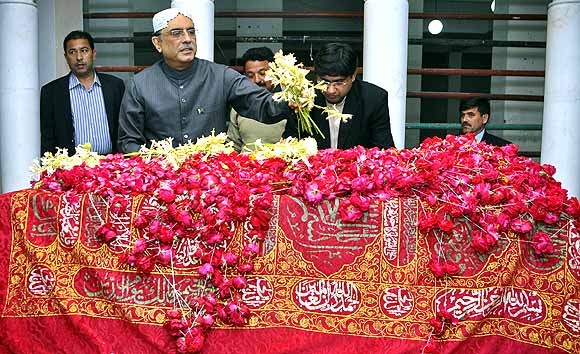
Having directly and indirectly managed the country's affairs and tasted political power for more than half the period of its post-independence 60-year life, the Pakistan army has ceased to be apolitical.
It was in the very first decade after Pakistan came into being in August 1947 that the army became a politicised force -- the power behind the throne in politics -- and thus soon seized political control.
Thereafter, the Pakistan army intervened frequently to seize political power and imposed military rule for long-drawn-out periods; the coups of General Ayub Khan in 1958 and General Yahya Khan in 1969 were followed by General Zia-ul Haq's US-backed and pro-jihad regime (1977 to 1988) and another Washington-backed anti-jihadi authoritarian regime headed by General Pervez Musharraf (1999 to 2008).
But having succeeded Musharraf as the army chief following his unceremonious exit, General Kayani had made it known that he would remain apolitical come what may and would never indulge his institution in politics.
Yet, being someone who had first-hand experience of serving with a army chief-cum-president of Pakistan and having seen his valour and glory as an unchallenged ruler, it was quite hard for General Kayani to resist the temptation to taste political power.
Please click on NEXT for more...
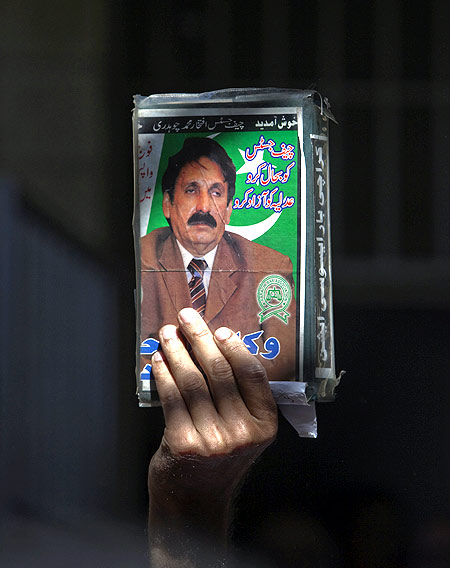
Hardly a year after his appointment as army chief, leaked diplomatic cables, courtesy Wikileaks, reported Kayani's musings about forcing out President Zardari, prompting the latter to make preparations for a military coup or assassination.
According to the leaked cables, which were made public on December 1, 2010, General Kayani told then US ambassador Anne Patterson during a March 2009 meeting in Islamabad that he might pressure President Zardari to resign.
Wikileaks further disclosed a conversation between Patterson, and General Kayani, in which the latter expressed unhappiness over a clause in the Kerry-Luger-Berman bill in the United States Congress which was about to curtail the Pakistan army's autonomy.
Kayani told the then US ambassador that he could have overthrown the Zardari government during the long march -- staged by the Nawaz Sharif-led Opposition for the restoration of the judges (who were deposed by Musharraf) in March 2009.
Please click on NEXT for more...
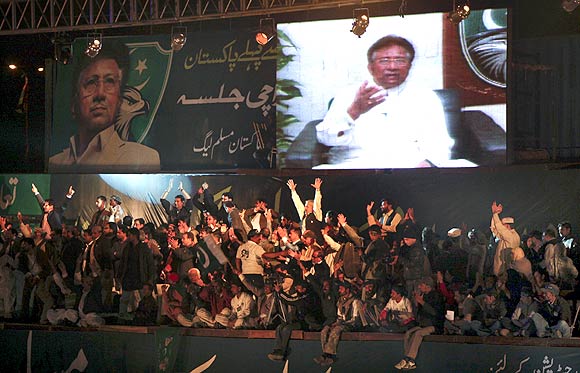
It was subsequent to these meetings and the pressure exerted by the establishment as well as the anti-government movement launched by the Sharif-led Opposition that the Zardari regime had to reinstate the 100-plus deposed judges of the superior courts, including the incumbent chief justice of Pakistan, Justice Iftikhar Chaudhry.
All the sacked judges were finally restored on March 16, 2009, almost two years after being sacked by Musharraf.
The keen interest shown by the establishment in the restoration of the deposed judges was attributed to the military's desire not to give a free hand to President Zardari and his government and to keep them under check of a defiant chief justice who was sacked by Musharraf due to his judicial activism.
It was a year after the restoration of the deposed judges that General Kayani managed -- in July 2010 -- a second three-year term as army chief -- something that no elected government in Pakistan had done before.
And it is the same troika of the army chief, the chief justice and the Opposition leader (Nawaz Sharif) which is now bent upon dislodging the Zardari government which is apparently not going to back down without a fight this time.